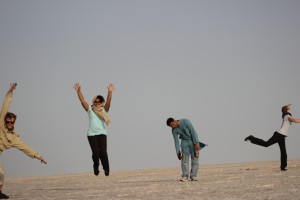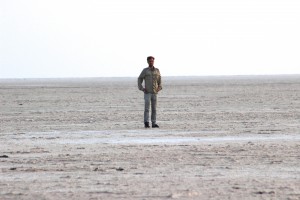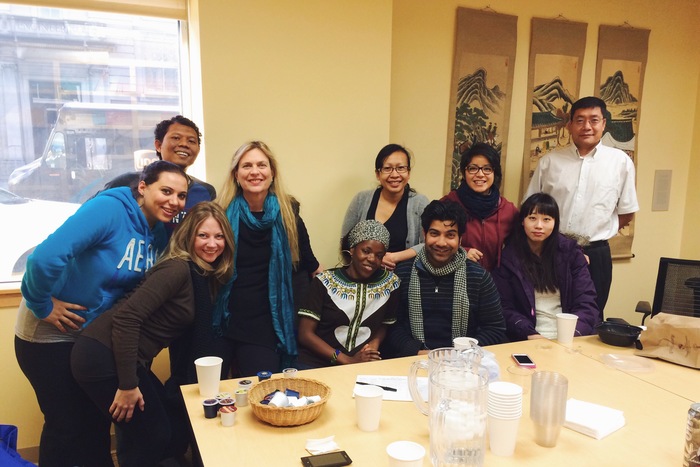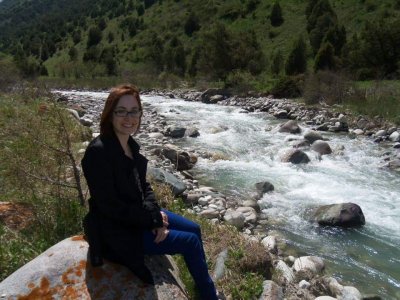
Cameron Kruse, 2012-2013, India (left), with fellow Fulbrighters Amruta Sarma, Ajit Rajiva, and Sabrina Dek surviving in the great Rann of Kutch
I wearily push my way through the crowd stepping around a cow as I approach the chai stand. I yell over the noise of the street “Dean masala chai baia,” which means, “three spiced chais please, brother,” in Gujarati. He expertly pours out three cups of chai as I wipe the unrelenting sweat from my brow. I grasp three small, dirty, chipped cups of chai welcoming the burning sensation on my fingers as it snaps me out of the lethargy induced by a losing battle against heat exhaustion; I spent the morning fruitlessly trying to determine the efficacy of medicinal plant extracts in a room far exceeding the ambient temperature of 120 ºF. Walking back to my colleagues, I distribute the cups. We stand sipping our chai as I address the ever-present curious onlookers in broken Gujarati: “My name is Brother Cameron. I am from the United States. I am here to study medicine from the drumstick plant. I am a Fulbrighter.”
At the risk of a third degree sunburn, I stand in the sun and allow my mind to drift back to when I was finishing my bachelor’s degree at Pepperdine University, trying to join the Fulbright family on a grant to India. I poured myself into countless drafts of my application, attempting to convey how I would leave my fingerprint on the world of medicinal plant science while engaging with my local host community. Look at me now, standing in the middle of the street, leaving my grimy fingerprint on a cup of chai, vainly trying to maintain forward progress on my research.
Fast-forward six months. For the last time, I pull up to the chai stand. My two coworkers are there waiting. “Brother Cameron, you made it!” And, somehow, I had. Clutching that last cup of chai, I realized that being part of the Fulbright family doesn’t necessarily mean publishing an academic paper on the immune regulating properties that I discovered in the plant I was studying. The Fulbright family leaves their imprints on small, dirty, chipped cups of chai, becoming one with other cultures and creating deeply rooted, authentic, mutual understanding.
To those of you who are considering joining the Fulbright family: Be completely authentic in your application. You become extremely vulnerable when you join our family. Fulbright wants you, not your idyllic self. To those of you who are currently abroad, I encourage you to persevere through setbacks, illness and homesickness. It is incredibly difficult to immerse yourself in another culture, but I know you can do it because you are a Fulbrighter – you are part of my family. To my fellow alumni: Thank you for being part of my family. I am honored to share this formative experience with each of you.
A special thanks to my family in Ahmedabad: Eleanor Hughes, Amruta Sarma, and Murtaza Zakhir. You are three of the smartest, most inspirational people I will ever know.




3 Comments
Can a person take benifit from Fulbright for a bachlor degree
Meena,
Please review the program eligibility requirements on the official Fulbright Program website: http://www.eca.state.gov/fulbright/information/undergraduate-and-graduate-students.
Good luck!
Very thoughtfully penned piece and a wonderful nugget of wisdom for all us Fulbrighters current and future!